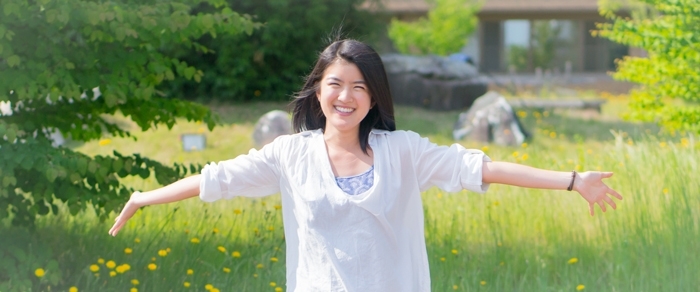
4th Year, Socio-Culture program, Faculty of Integrated Arts and Sciences
Aika Yamane
<Graduated from Kalani High school from Hawaii>
“HU Student Voices” gives our prospective students an insight into the perspectives of HU students. As the 18th interview in this series, we talked to Aika Yamane, a 4th year student studying at Faculty of Integrated Arts and Sciences.
Ms. Yamane was born in Japan, and lived in Hawaii from age 4 to 18. Hiroshima University is her first school in Japan. We interviewed her about the reason why she decided to apply for a university in Japan, her classes, research, club activities, and study abroad experience at Manchester University.
You’re from Hawaii!
Yes, I was born in Hiroshima but I moved to Hawaii when I was four-years-old because of my father’s job. I learned most of my subjects in English because I attended Hawaii’s school from preschool to high school.
Why did you decide to go to university in Japan?
I spoke Japanese with my family, and studied Japanese on the weekends through correspondence courses but it was definitely a struggle. Learning Japanese without a teacher was not easy. I couldn’t understand Japanese classics at all. Before coming to Japan, speaking and reading in English was much easier than Japanese. I decided to study in a university in Japan because I wanted to be able to confidently say that I am bilingual.
Why did you apply for Hiroshima University’s Integrated Arts and Sciences?
In Hawaii’s schools we do not have separate courses like “Humanities courses” or “Mathematic courses”. I wanted to continue studying various subjects in university. I was attracted to Hiroshima University’s Integrated Arts and Sciences faculty because their goal is “to strive to attain knowledge necessary to tackle complex problems of the 21st century by not only deepening the knowledge of one field of research but through integration and collaboration with other fields of research”. My parents still live in Hawaii, so it was a bonus that my relatives live in Hiroshima.
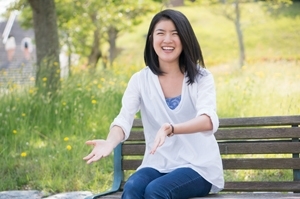
Entering Hiroshima University full of hope!
I see you had connection to Hiroshima. Please tell me more about after entering university
It was challenging keeping up with class. I had no problem with conversation in Japanese but I couldn’t understand many technical terms used in class. With the help of my friends I was able to keep trying my best.
Did you join any clubs?
I joined the School festival executive committee. Ever since junior high school, I was part of clubs such as student council or graduation committee. I enjoy planning events so I wanted to join a similar club in Japan.
I remember being blown away by how detailed and organized the events were planned in Japan. Compared to Hawaii, Japan’s style was neatly planned and the risk management was splendid. It was such a good learning experience. I experienced countless “Culture surprises”.
Culture surprise? Can you explain more in detail?
After coming to Japan, I realized that the “Culture barrier” was much bigger than “Language barrier”. Usually, “Culture barrier” is expressed as “Culture shock” which has a negative connotation, but to me, it was more of a positive “Culture surprise”. Whenever I talk to friends from my faculty or club and learn something new about a culture difference between Japan and Hawaii, I thought “Wow culture is so interesting!” I wanted to learn more about Japan’s culture and cultures around the world. This is why I chose the socio-culture course in my second year.
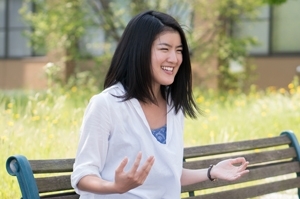
Ms. Yamane says “Thinking about cultural differences positively, makes me happy”
What are some points you like about the Socio-culture program?
In the socio-culture program, teachers have various areas of specialties. I can learn from the point-of-view of economics, law, politics, religion, history.. etc. It gives me the opportunity to understand different problems in a completely new perspective. When I was a first year student, I could only understand the classes separately, but now as a fourth year, it’s interesting to notice that all of these problems are linked to each other.
What are you planning to write about in your final thesis?
I am currently researching about “Problems of Early Forced Marriage”. Girls (as young as ten-year-olds) are forced into marriage in many parts of the world. These girls are married to men that are much older and in most cases, taken out of school. They go through child birth when their hips are under developed, live a life working like a slave, and never see their family again. Soon I plan to narrow down my research to a specific region and concentrate on finding a solution.
What is the atmosphere like in your research seminar?
In my research seminar, the graduate students and undergraduate students present their own research to each other. I enjoy these presentations because all of the students are researching about unrelated topics. In every presentation I learn something new! Recently, there was a presentation and discussion about the history of Philippines and ethnic minority groups in Taiwan. Professor Emiko Nakasaka is my mentor. I immediately feel relaxed and happy talking to her because she is very kind. Professor Nakasaka teaches me about international law. I started learning international law after returning from my study abroad so I still need to study the fundamentals of this subject.
While you were in Hiroshima University, did you study abroad anywhere?
I studied abroad through Hiroshima University’s HUSA (Hiroshima University Study Abroad) program. I studied at Manchester University (England) for nine months starting in the second semester of my second year to the first semester of my third year in university. I mainly took courses to learn about how to improve aid for developing countries.
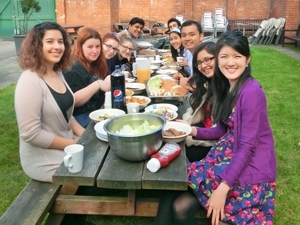
In Manchester, it is rainy 9 days out of 10. When the sun comes out, everyone likes to have lunch outside.
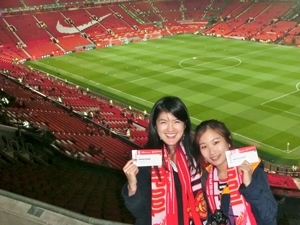
Going to watch a Manchester United game with a dormitory hall mate
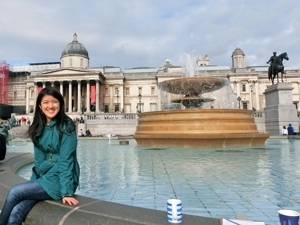
A sunny day in London
Please tell me a memorable event during the study abroad
I was blessed with many incredible friends during the study abroad. The 16 people from 16 different countries were like family to me. We planned a new intercultural event every two weeks. The most memorable event was hosting the “Japanese evening”.
Can you tell me more about the “Japanese evening”?
I did a fun presentation about Japan for about 30 minutes and we all cooked Japanese food for the guests. As the host of the event, I walked around the tables and talked about Japan with the guests. Also, there were other activities like “Origami” and “English Karuta game”.
The planning part before the event was a little tough but it was a great opportunity to learn more about Japanese culture as well. I enjoyed teaching the members how to cook Japanese food and thinking about how we can efficiently sell tickets, etc. I was filled with happiness when 85 tickets sold out 3 days before the event!
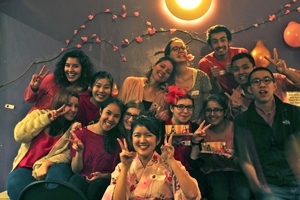
Photo after a successful Japanese evening
You seem to have led a busy but satisfying study abroad life! What are your plans for the future?
Before Hiroshima University, I wanted to learn Japanese thoroughly, return back to America and work there. After experiencing the “Japan style”, I started to want to experience the Japanese business style too. I am planning to work in Japan after graduation.
Lastly, please give a message to our “future Hiroshima University” students that are thinking about applying to Hiroshima University.
I feel I made a great decision to come to Hiroshima University. It has a warm atmosphere and the university provides you with countless opportunities to challenge yourself. There are options other than the program that I used to study abroad and the “INU seminar” held in the summer is an amazing event. It is a program to think about peace with professors and students from all over the world. Also, Higashi Hiroshima city is full of foreign people and international students. I hope all the students thinking about studying at Hiroshima University will have uncountable numbers of wonderful experiences!
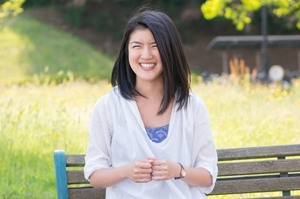
May 25, 2015
Reports and Photograph: i (PR Group)
Location: Bench near the Faculty of Letters


 Home
Home





